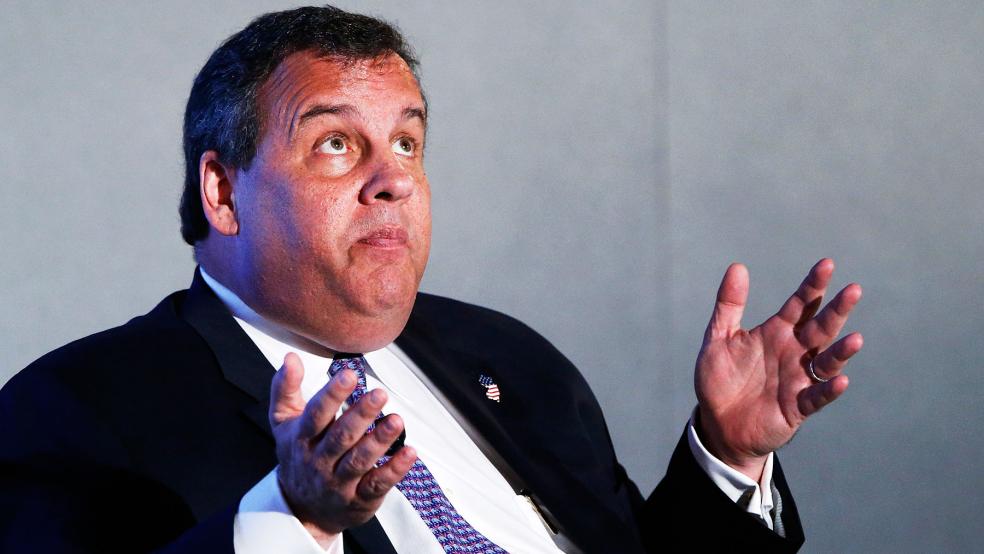For a politician whose presidential ambitions are in jeopardy, whose once soaring poll numbers have tanked, and who faces renewed budget crises back home, Republican New Jersey Gov. Chris Christie was in a jovial and philosophical mood on Wednesday during an appearance at a fiscal summit in Washington.
Christie once led the pack among GOP presidential hopefuls. But nearly five months since "Bridgegate" surfaced like a political hurricane, Christie's reputation as a tough-talking straight shooter who can work both sides of the political aisle has been badly tarnished. And now he looks at best like a long-shot for the 2016 Republican presidential nomination.
Related: Chris Christie Comes Roaring Back
Yet, you couldn't tell that earlier today as Christie chatted amicably with Bob Schieffer, anchor of CBS News' Face the Nation, during a noon hour session of the Peter G. Peterson Foundation's fifth annual fiscal summit. Pete Peterson also owns and separately supports The Fiscal Times.
On the question of whether the scandal will hurt his ability to work with Democrats and even Republicans in his state legislature or run for president in 2016, Christie replied, "Well, no, it won't have any impact upon the budget problems because we have a constitutional responsibility to fix them," he said. "And as far as the impact on my political future, I think it will have none – because I didn't do anything."
In one of the great ironies of politics, the scandal broke in January shortly after Christie scored an impressive reelection victory with substantial Democratic support that helped catapult him to the front of the pack of Republicans contemplating a presidential bid in 2016.
Christie's reputation abruptly faltered after questions emerged about his office's connections to lane closures on the George Washington Bridge the previous fall, seemingly designed to punish the citizens of Fort Lee, N.J. because their Democratic mayor didn't support Christie for reelection.
Related: Chris Christie's Biggest Problem Isn't 'Bridgegate'
"So I understand the circus that this becomes," Christie said today. "You get 51 percent of the vote in a blue state in November, and then all of a sudden a couple of staff people do something that shouldn't be done. I fire them and all of a sudden this becomes the biggest story in the country for a couple of months.
"In the end what the people of New Jersey know about me is that I tell them the truth," he said. "I told them I didn't do it and now you have all kinds of people looking into this for nearly four and a half months now, and there hasn't been one suggestion that I knew anything about it.
"I'm not the first chief executive who had someone on their staff do something they didn't know something about that they disapproved of and they had to fire them. I don't think that hurts anybody's career and it's not going to hurt mine."
Asked by Schieffer whether he is still thinking of running for president and when he would finally decide, Christie replied, "Yes, and later."
Beyond the "Bridgegate" controversy, Christie blamed his state's $807 million budget shortfall, underfunded pension program, and downgraded state credit rating on grossly inaccurate revenue projections, intransigence from the Democrats in the state legislature and long festering budget problems.
Related: Christie Bridgegate Scandal Has Long Off-Ramp
"I'm trying in the last five years to fix problems that we've accumulated over the last 20," he said. "There's good news and bad news: The bad news is that what I'm trying to do is never fun. But the good news is that we know it and we're going to choose to confront it or not – and that's why I have to deal with the Democrats in the legislature."
Although he declined to offer specifics on how he would get out of the budget bind, he said it would not include raising taxes.
He said he would support an increase in the federal minimum wage, but only if it were gradually phased in and that he was convinced it wouldn't harm the economy or job market.
Former 2012 Republican presidential nominee Mitt Romney said last week he supports an increase in the minimum wage. "Frankly, our party is all about more jobs and better pay," Romney said. Romney's comments come after Senate Republicans rejected a vote on a Senate bill that would have increased the minimum wage to $10.10. Recently, though, former Minnesota Gov. Tim Pawlenty and former Pennsylvania Sen. Rick Santorum said they supported some increase in the minimum wage.
Related: GOP Moderates Break Their Silence to Defend Christie
Last November, New Jersey voters overwhelmingly approved a ballot a raise in the minimum wage from $7.25 to $8.25 an hour in January and amended the state Constitution to tie future increases to inflation.
Christie opposed the measure, arguing that the increase should have been gradually phased in.
"My view is, absolutely we should be raising the minimum wage but we need to do it in a responsible and graduated way so that businesses can prepare for the impact and it doesn't have a negative impact on employment," Christie said today.
He added that Washington politicians shouldn't treat an increase in the minimum wage as the "holy grail," and that there are more important issues to address relating to economic inequality and social mobility.
Finally, in a moment of reflection, Christie offered this bit of advice to his party:
"I think what our party needs to be focused on is explaining ourselves and not appearing to be intolerant. You know there are lots of different ways to be able to have political success in this country. I don't think you do it by not letting people what you really believe. You shouldn't be afraid of what you believe. You need to tell people what you believe. But you also have an obligation to explain it in a way that people can understand it."
Top Reads from The Fiscal Times:





